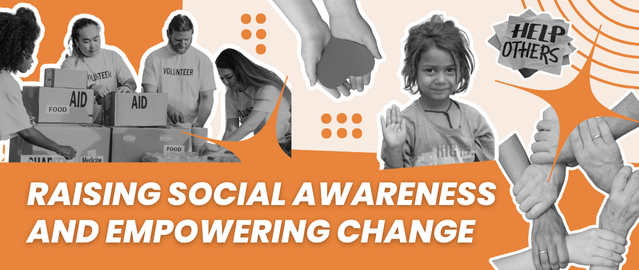Raising Social Awareness and Empowering Change
In today’s fast-paced world, raising social awareness and empowering change have become critical to creating a more equitable and inclusive society. Social awareness involves recognizing and understanding the issues affecting communities and individuals, ranging from environmental concerns to social justice issues. By increasing awareness, we can foster a society that is more informed, compassionate, and motivated to enact positive changes.
- Raising Social Awareness
Raising social awareness starts with education. This can be achieved through various channels such as social media campaigns, educational programs, public service announcements, and grassroots movements. The goal is to inform and sensitize the public about pressing issues, thereby fostering a culture of empathy and understanding. One effective method is storytelling, which humanizes issues by highlighting personal experiences and real-life impacts. Documentaries, articles, and social media posts that share individual stories can make abstract problems more relatable and urgent.
Additionally, collaborations between organizations, influencers, and media outlets can amplify messages, reaching a broader audience and creating a ripple effect. For example, climate change activists have successfully used these strategies to raise awareness about the environmental crisis, leading to increased public concern and demand for policy changes.
- Empowering Change
Empowering change goes beyond awareness; it involves taking action to address the issues identified. Empowerment can be both individual and collective. On an individual level, education and skills training can equip people with the tools they need to advocate for themselves and their communities. For instance, workshops on digital literacy can empower marginalized groups to voice their concerns and participate in the digital age.
Collectively, empowerment can be achieved through community organizing and activism. Grassroots movements have historically played a crucial role in driving social change. By mobilizing communities, these movements can push for policy reforms and hold leaders accountable. Moreover, partnerships between nonprofits, businesses, and governments can create systemic change. Corporate social responsibility initiatives and public-private partnerships can address social issues on a larger scale, leveraging resources and expertise to implement sustainable solutions.
- The Role of Technology
Technology has revolutionized the way we raise awareness and empower change. Social media platforms allow for the rapid dissemination of information, enabling movements like #MeToo and Black Lives Matter to gain global traction. Crowdfunding platforms provide financial support for causes, and online petitions can influence policymakers. However, the digital divide remains a challenge. Ensuring that all communities have access to technology and the internet is crucial for equitable participation in these efforts.
Conclusion
Raising social awareness and empowering change are essential components of building a better world. Through education, storytelling, and collaboration, we can inform the public about critical issues. By providing individuals and communities with the tools and support they need, we can drive meaningful action and create lasting change. As we move forward, leveraging technology and fostering inclusive participation will be key to these efforts. Together, we can build a more informed, compassionate, and proactive society.


